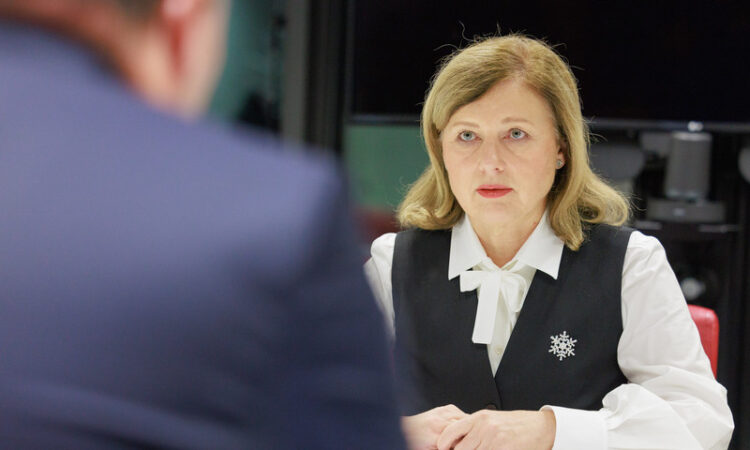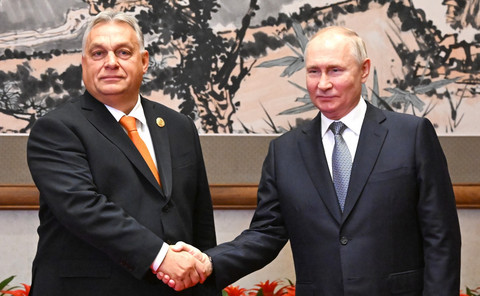
Hungary is more isolated than ever in Europe due to its leader’s close ties to Russia on top of democratic backsliding, EU values commissioner Věra Jourová has said.
“Hungary is [on] the highest level of isolation, but not because of the rule of law — because of its position towards Russia, shaking hands with Putin,” Jourová told EUobserver in an interview.
The EU has withheld funds and threatened other sanctions due to Hungarian prime minister Viktor Orbán’s illiberal rule at home.
But what Jourová called Orbán’s “double game” was epitomised for some in his handshake with Russian president Vladimir Putin in China in October last year.
EU leaders were using increasingly undiplomatic language about Orbán’s pro-Russian games, Jourová said.
And she dismissed Hungary’s go-to line that she was “Hungarophobic”, saying EU criticism was obviously being aimed at Orbán’s wrongdoing, not Hungarian people.
“It is not the same thing,” Jourová, who is a Czech politician, said.
“He [Orbán] mistook the century,” she added, alluding to the 18th-century French king Louis XIV, who equated himself with the French state.
Jourová spoke as Hungary prepared to take up the EU Council presidency in July, despite European Parliament protests.
The European Commission also unfroze €10.2bn of Hungary’s money in December, prompting the EU Parliament to sue its sister EU institution for misbehaviour.
But Jourová defended Brussels’ course of action.
The EU presidency role, given the ongoing Russian warfare in Ukraine, will put Orbán’s behaviour under greater scrutiny, Jourová indicated.
“If he [Orbán] wants to collect some respect, at least he will have to behave professionally and play this neutral role,” she said.
“But Viktor Orbán has surprised us so many times, that we might see a different approach,” she added.
The €10.2bn were released following judicial reforms in Hungary, she said.
“We had to play fair and be honest and respect the rule of law. Indeed they fulfilled what we wanted,” Jourová said.
“There’s a big pile of things they still have to do,” she also said, referring to the release of €19bn that the EU Commission was still withholding from Budapest.
Orbán had dismantled democracy in Hungary “in very small steps” since 2010 which were almost “unnoticeable”, Jourová said.
And this way why Hungary also faced an ongoing sanctions procedure under Article 7 of the EU treaty, which could result in a suspension from EU Council votes, she said.
EU states got closer than ever to a consensus on triggering punitive measures in 2021, when Orbán passed a controversial anti-LGBTQI law.
Some 18 states wanted to go ahead, but the rest stayed silent, in what Jourová called a “missed opportunity”.
That was back when the far-right Law and Justice party (PiS) ruled Poland, also faced EU sanctions, and backed Hungary.
Poland elected the pro-EU Donald Tusk as prime minister last year, changing EU Council dynamics.
And Tusk has presented the EU Commission with a rule-of-law reform package designed to unblock access to up to €137bn in withheld EU funds.
The package was “realistic”, Jourová said, but contained elements that needed to be signed off by Polish president Andrzej Duda, who is a PiS ally, putting the project at risk.
Jourová said she would like to leave the commission when her mandate ends this year seeing Poland fit for purpose again.
“This is my dream,” she said. “The mountain in front of the Polish government is huge and they are climbing,” she said.
EU-image blows
Jourová had also handled the transparency portfolio in her previous EU Commission mandate.
And this issue “definitely needs more work” in Brussels, she said.
“The trust of the citizens [in EU institutions] has been diminished during the last years” for different reasons, she said.
This was due to, at times “miserable” communication skills by officials and diplomats, Jourová said, but also due to “elitist behaviours, underserved privileges, [and] black-box situations” in the EU capital.
The Qatargate corruption scandal in December 2022 was a “horrible blow” which affected all institutions, by creating the “general feeling that there is something rotten in Brussels”, she said.
The 59-year-old liberal politician has said she won’t seek a third term in the EU Commission.
She urged liberal parties to speed up their campaigns and deliver “realistic plans” to voters ahead of the EU Parliament election in June, where pollsters predict a surge in support for extremist parties.
“In political circles, there’s [a] long-standing question about where is the political centre now?,” Jourová said, noting that centre-right EU parties had drifted further right than before.







